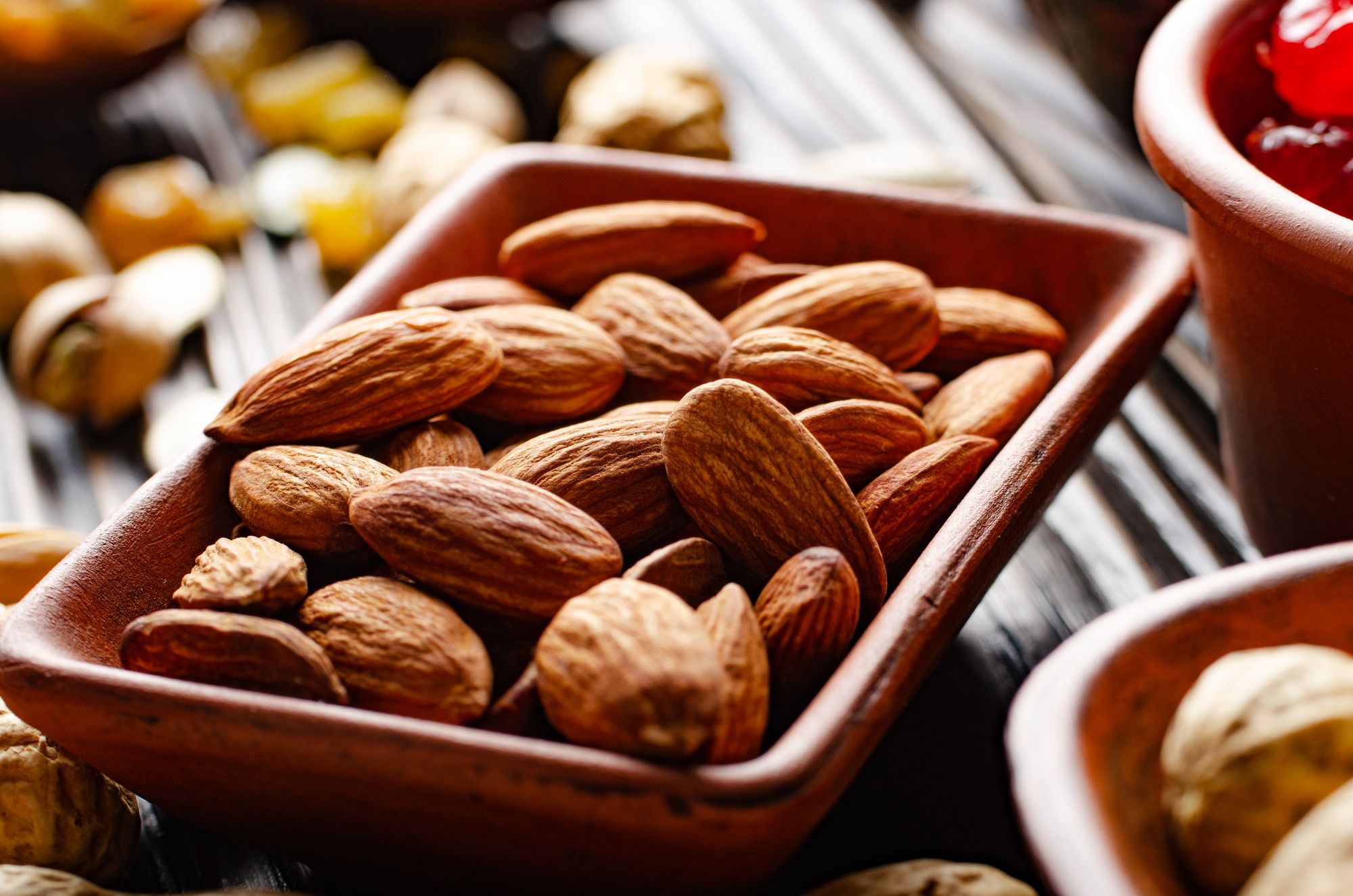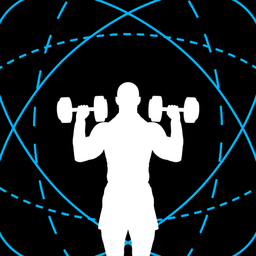4 Health Benefits of Almonds You’ll Go Nuts Over
What's your favorite nut? Never mind, it doesn't matter, because after learning of almond's benefits here, your answer will always be, "almonds".

Close your eyes. Imagine biting into an almond.
Savor the crunch as the nut's warm, toasty, earthy flavor floods your mouth. Wickedly delicious.
But almonds aren’t just big on taste but also on health benefits.
🤨 — are you sporting this expression? Then, continue reading. We're certain (like, 99.999% sure) you'll be convinced by the end of this article.
#1: Improves cholesterol levels and heart health
To lower LDL (i.e., “bad cholesterol”) levels:
- Maintain a healthy weight
- Avoid trans-fat and smoking
- Cut down on alcohol
- Eat loads of fiber
- Exercise regularly
… *yawn* You already know all that.
So, here’s something you might not know. Almonds are great for your heart, too, as shown in a 2023 randomized controlled trial published in Obesity.
The researchers randomly assigned 140 participants to 2 groups:
After 3 months, both groups lost about 7 kg, but the AED group reduced their small triglyceride-rich particles and small LDL particles* to a greater extent than those in the NFD.
*Small LDL particles carry the greatest risk of clogging up your arteries.
Wondering how the almond exerts such powerful benefits on your heart?
As the 2023 RCT points out, “Nuts contain unsaturated fats, or healthy fats, which can improve blood cholesterol levels, ease inflammation, and contribute to a healthy heart.”
#2: Supports weight loss
Almond's benefits — include weight loss?
??? Um. Aren’t almonds ridiculously high in fat, the most energy-dense macronutrient, which boasts 9 whopping calories per gram?
They are. But let’s not forget that fat is also incredibly satiating, second only to holy protein.
Want to learn about other fullness-promoting foods helpful during calorie restriction?

A study recently published in Clinical Nutrition ESPEN found fat-rich almonds so satiating that they helped participants shed 2.72 kg and 2% in body fat in just 3 months.
Wait, wait. What, exactly, happened in the study?
We’ll tell you. All the researchers did was randomly assign participants with prediabetes to 2 groups:
*20 grams of almonds = 24 to 30 almonds. Roughly.
Yes, that’s it. There were no other interventions.
After 3 months, as mentioned earlier, the almond group experienced significant improvements in body weight and body composition compared to those in the non-almond group.
Perhaps more impressively, 23.3% (7 out of 30) of participants in the almond group saw a reversion from prediabetes to normal blood sugar levels.
I.e., this means almond’s benefits may tentatively include helping individuals with prediabetes achieve remission — preventing their condition from progressing into full-blown type 2 diabetes!
#3: Promotes workout recovery
You can add a nut-sized tool (heh-heh, OK, sorry, we need to grow up) to your arsenal of recovery-promoting strategies.

In a 2022 study published in Frontiers in Nutrition, researchers randomly assigned participants to 2 groups:
- Almond group: Consumed 57 grams of almonds daily in split doses (half in the morning, half in the afternoon)
- Snack group: Ingested a calorie-matched snack bar in split doses
After 4 weeks of almond "supplementation", 69% of those in the almond group had higher concentrations of 12,13-DiHOME in their blood plasma than those in the snack group. These individuals (with elevated 12,13-DiHOME levels) reported feeling:
- Less fatigue and tension
- Better leg-back strength
- Decreased muscle soreness
… after a 90-minute workout session that included a 50-meter shuttle run, vertical jump, bench press, and leg-back strengthening exercises.
#4: Enhances performance in the bed 🥵
Can the almond benefit you … sexually? *lifts eyebrow*
A 2019 study published in Nutrients says a raging yes. At least for the men. The researchers recruited 83 healthy men aged between 18 and 35 with no history of erectile dysfunction and randomly assigned them to 2 groups:
- Nuts group: Given 60 grams of nuts (30 grams of walnuts and 15 grams each of almonds and hazelnuts) to eat daily
- No-nuts groups: Ate per usual, without nuts
After 14 weeks, the researchers found that those in the nuts group had greater sexual desire and better orgasms than those in the no-nuts group.
Hmm. But what about the women?
While there aren't any female-specific studies on almond's libido-enhancing benefits, one can argue that the nut would be helpful since:
- We’ve established that almonds may help promote a healthy weight and body fat percentage, and
- Research shows that a healthy weight benefits the female sexual function — from sexual arousal, lubrication, and sexual satisfaction
Don’t overdo almonds
Before you get too enamored with almonds (their health benefits are scrumptious), please know that you can eat too many almonds.
Almonds are fat, even if it’s “healthy fat”.
And too much of it will still lead to weight gain.
Also, almonds are rich in vitamin E; you get 7.4 mg of the fat-soluble (i.e., any excess will build up in your organs!) vitamin per ~28 grams of nuts, which is already roughly half of the 15 milligrams you need daily.
Too much vitamin E in your body can trigger an overdose situation, causing:
- Lethargy
- Blurred vision
- Headaches
- Diarrhea
That’s why the best approach is balance.
Maybe eat a couple of almonds (we're talking 5 to 6, not 20) before each meal. And make sure you adopt healthy lifestyle practices in addition to your increased almond intake, such as:
- Sleeping enough
- Managing your stress levels
- Taking care of your nutrition + fitness*
*On that note, if you need help planning your training or diet, why not check out GymStreak? This smart, AI-powered personal trainer app tailors your workouts and meals to your needs, preferences, and fitness goals.
Check it out here:
Workout Programming + Nutrition Tracking, Off Your Hands
*sigh of relief* We'll guide you through it all — step-by-step. Just download the app, and you'll be making progress toward your dream body like never before.
References
Abdelsamea, Gehan A., et al. “Impact of Weight Loss on Sexual and Psychological Functions and Quality of Life in Females with Sexual Dysfunction: A Forgotten Avenue.” Frontiers in Psychology, vol. 14, 2023. Frontiers, https://www.frontiersin.org/articles/10.3389/fpsyg.2023.1090256.
Carter, Sharayah, et al. “Almonds vs. Carbohydrate Snacks in an Energy-Restricted Diet: Weight and Cardiometabolic Outcomes from a Randomized Trial.” Obesity, vol. 31, no. 10, 2023, pp. 2467–81. Wiley Online Library, https://doi.org/10.1002/oby.23860.
FoodData Central. https://fdc.nal.usda.gov/fdc-app.html#/food-details/170567/nutrients. Accessed 22 Dec. 2023.
Gulati, Seema, et al. “Premeal Almond Load Decreases Postprandial Glycaemia, Adiposity and Reversed Prediabetes to Normoglycemia: A Randomized Controlled Trial.” Clinical Nutrition ESPEN, vol. 54, Apr. 2023, pp. 12–22. PubMed, https://doi.org/10.1016/j.clnesp.2022.12.028.
Kemnic, Tyler R., and Meghan Coleman. “Vitamin E Deficiency.” StatPearls, StatPearls Publishing, 2023. PubMed, http://www.ncbi.nlm.nih.gov/books/NBK519051/.
Salas-Huetos, Albert, et al. “Effect of Nut Consumption on Erectile and Sexual Function in Healthy Males: A Secondary Outcome Analysis of the FERTINUTS Randomized Controlled Trial.” Nutrients, vol. 11, no. 6, June 2019, p. 1372. PubMed Central, https://doi.org/10.3390/nu11061372.
Vekic, Jelena, et al. “Atherosclerosis Development and Progression: The Role of Atherogenic Small, Dense LDL.” Medicina, vol. 58, no. 2, Feb. 2022, p. 299. PubMed Central, https://doi.org/10.3390/medicina58020299.


